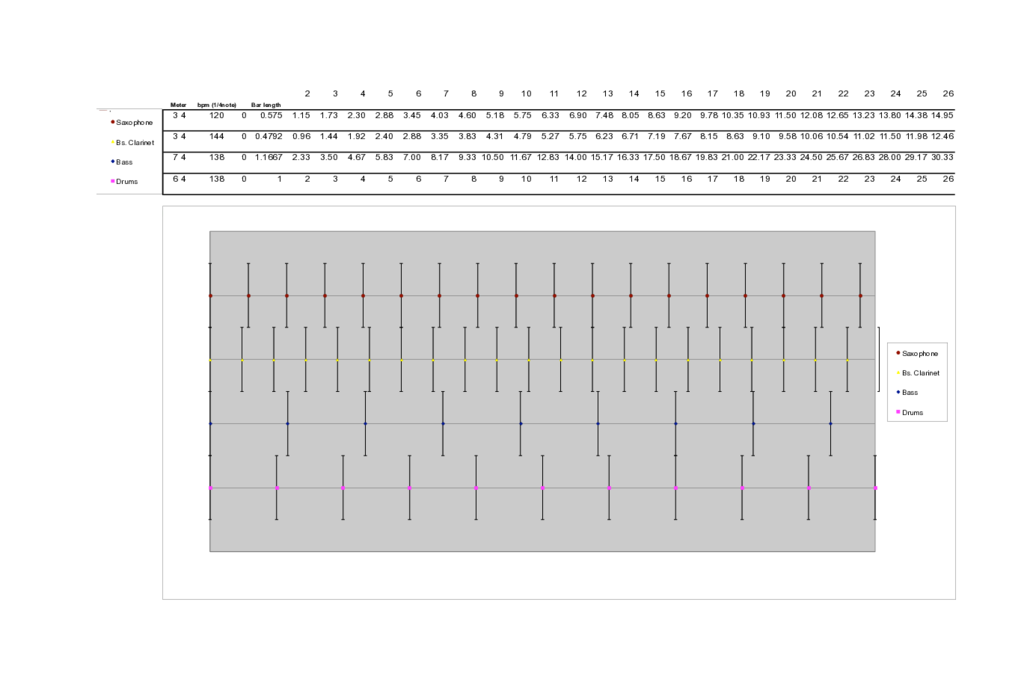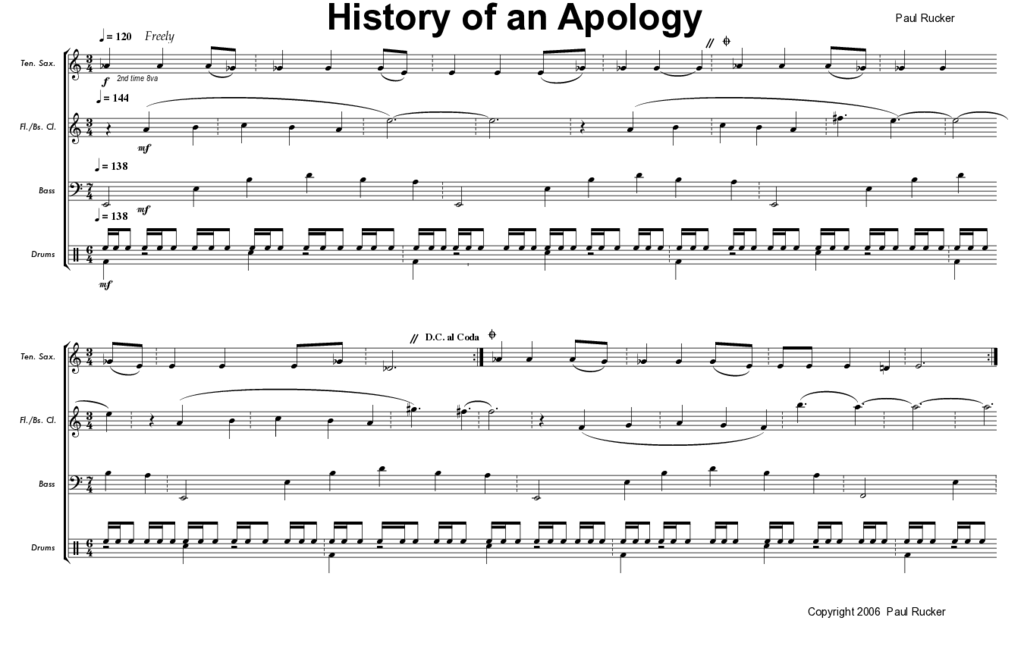Music Composition, ensemble recordings, chamber works.
-
Middle Passage - Multiple Metronomic CompositionString Quartet performed by SAINT HELENS STRING QUARTET. I used 3 violins instead of 2 violins and viola. This work is based on transatlantic slave trade. The Middle Passage was the stage of the triangular trade in which millions of people from Africa were shipped to the New World as part of the Atlantic slave trade. Ships departed Europe for African markets with manufactured goods, which were traded for purchased or kidnapped Africans, who were transported across the Atlantic as slaves; the slaves were then sold or traded for raw materials,which would be transported back to Europe to complete the voyage. Voyages on the Middle Passage were a large financial undertaking, and they were generally organized by companies or groups of investors rather than individuals. The "Middle Passage" was considered a time of in-betweenness for those being traded from Africa to America.
-
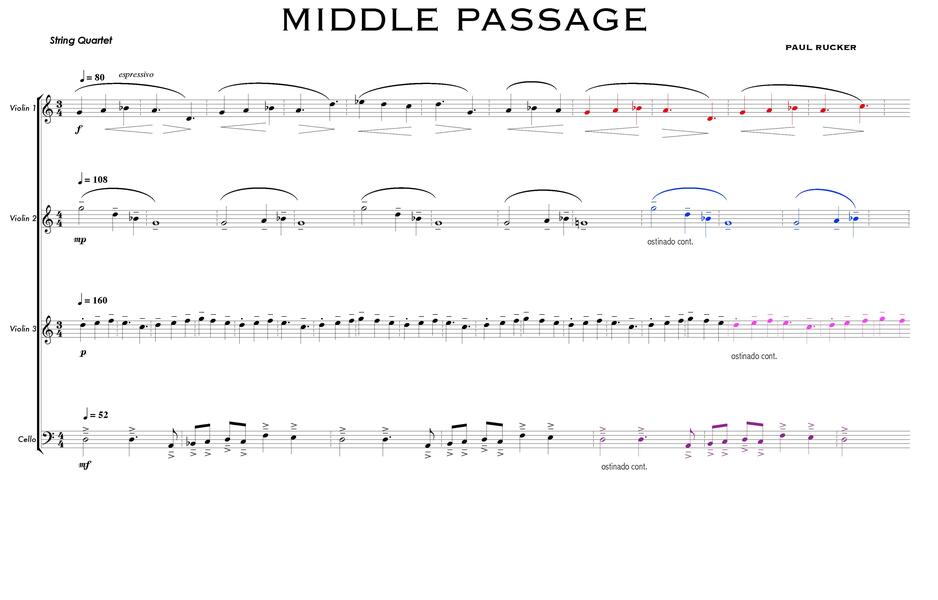 Middle Passage - Multiple Metronomic CompositionString Quartet performed by SAINT HELENS STRING QUARTET. I used 3 violins and 1 cello instead of 2 violins 1 viola and 1 cello. This work is based on transatlantic slave trade. The Middle Passage was the stage of the triangular trade in which millions of people from Africa were shipped to the New World as part of the Atlantic slave trade. Ships departed Europe for African markets with manufactured goods, which were traded for purchased or kidnapped Africans, who were transported across the Atlantic as slaves; the slaves were then sold or traded for raw materials, which would be transported back to Europe to complete the voyage. Voyages on the Middle Passage were a large financial undertaking, and they were generally organized by companies or groups of investors rather than individuals. The "Middle Passage" was considered a time of in-betweenness for those being traded from Africa to America. The close quarters and intentional division of pre-established African communities by the ship crew motivated captive Africans to forge bonds of kinship which then created forced transatlantic communities. These newly established bonds greatly impacted and altered African identity and culture within each community. It was a significant contributing aspect to the slaves' survival of the "Middle Passage" and carried into their life in America.
Middle Passage - Multiple Metronomic CompositionString Quartet performed by SAINT HELENS STRING QUARTET. I used 3 violins and 1 cello instead of 2 violins 1 viola and 1 cello. This work is based on transatlantic slave trade. The Middle Passage was the stage of the triangular trade in which millions of people from Africa were shipped to the New World as part of the Atlantic slave trade. Ships departed Europe for African markets with manufactured goods, which were traded for purchased or kidnapped Africans, who were transported across the Atlantic as slaves; the slaves were then sold or traded for raw materials, which would be transported back to Europe to complete the voyage. Voyages on the Middle Passage were a large financial undertaking, and they were generally organized by companies or groups of investors rather than individuals. The "Middle Passage" was considered a time of in-betweenness for those being traded from Africa to America. The close quarters and intentional division of pre-established African communities by the ship crew motivated captive Africans to forge bonds of kinship which then created forced transatlantic communities. These newly established bonds greatly impacted and altered African identity and culture within each community. It was a significant contributing aspect to the slaves' survival of the "Middle Passage" and carried into their life in America. -
Day TwoOIL CD Day Two Improvised CD Hans Teuber - Alto Sax Paul Rucker - Cello Track Listing Day Two 6:57 OIL 4:16 Pussy in the Sky 3:12 Napal 0:55 Some Are More Equal 4:11 Palmetto 4:59 Feed Your Enemy 1:39 Somber Time 3:46 Day One 11:49
-
 Oil CDOil CD Has Teuber - Alto Sax Paul Rucker - Cello Track Listing Day Two 6:57 OIL 4:16 Pussy in the Sky 3:12 Napal 0:55 Some Are More Equal 4:11 Palmetto 4:59 Feed Your Enemy 1:39 Somber Time 3:46 Day One 11:49
Oil CDOil CD Has Teuber - Alto Sax Paul Rucker - Cello Track Listing Day Two 6:57 OIL 4:16 Pussy in the Sky 3:12 Napal 0:55 Some Are More Equal 4:11 Palmetto 4:59 Feed Your Enemy 1:39 Somber Time 3:46 Day One 11:49 -
History of an ApologyJazz Suite based on the Tuskegee Experiment. Full CD is located here for free: http://paulrucker.com/projects/recordings/history_of_an_apology I also created a comprehensive webpage about the Tuskegee Experiment: http://paulrucker.com/activism/tuskegee_experiment For forty years between 1932 and 1972, the U.S. Public Health Service (PHS) conducted an experiment on 600 black men—399 in the late stages of syphilis and 201 in a control group. These men, for the most part illiterate sharecroppers from Macon, one of the poorest counties in Alabama, were never told what disease they were suffering from or of its seriousness. Informed that they were being treated for “bad blood,” their doctors had no intention of curing them of syphilis. The data for the experiment was to be collected from autopsies of the men, and they were thus deliberately left to degenerate under the ravages of tertiary syphilis, which can include tumors, heart disease, paralysis, blindness, insanity, and death.
-
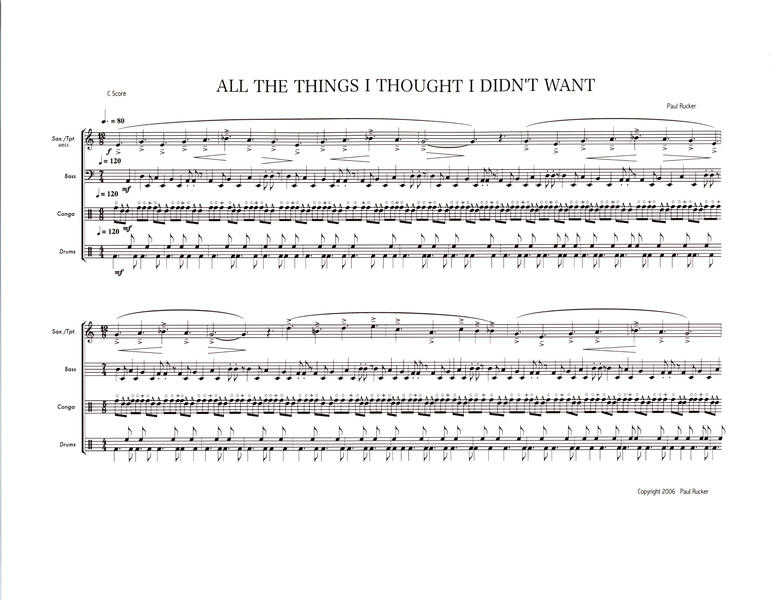 All the Things I Thought I Didn't WantALL THE THINGS I THOUGHT I DIDN'T WANT Work Sample Description This composition utilizes poly-meter and poly-tempo. All the lines except for the lead melody share the same tempo of 120 bpm (beats per minute); the quarter note equals one beat. The lead line is playing at 80 bpm and the dotted quarter note equals one beat. On the chart you can see that the lead line does not line up with the other measures regularly. Looking at the “beat map” from the software, you can see the constant 3rd beat in the bass meets every second beat in the melody. In other words, the relation of 120bpm and 80bpm is as follows: 80bpm x 1.5 = 120 bpm (Dotted quarter note equals 50% greater duration than a quarter note) Jovino Santos Neto—Melodica Hans Teuber—Soprano, Alto Saxophones Jay Roulston—Trumpet Bill Horist—Guitars Jeff Busch—Percussion Jacques Willis—Drums Elizabeth Pupo-Walker—Conga Paul Rucker—Bass Full CD located here: http://paulrucker.com/projects/recordings/history_of_an_apology
All the Things I Thought I Didn't WantALL THE THINGS I THOUGHT I DIDN'T WANT Work Sample Description This composition utilizes poly-meter and poly-tempo. All the lines except for the lead melody share the same tempo of 120 bpm (beats per minute); the quarter note equals one beat. The lead line is playing at 80 bpm and the dotted quarter note equals one beat. On the chart you can see that the lead line does not line up with the other measures regularly. Looking at the “beat map” from the software, you can see the constant 3rd beat in the bass meets every second beat in the melody. In other words, the relation of 120bpm and 80bpm is as follows: 80bpm x 1.5 = 120 bpm (Dotted quarter note equals 50% greater duration than a quarter note) Jovino Santos Neto—Melodica Hans Teuber—Soprano, Alto Saxophones Jay Roulston—Trumpet Bill Horist—Guitars Jeff Busch—Percussion Jacques Willis—Drums Elizabeth Pupo-Walker—Conga Paul Rucker—Bass Full CD located here: http://paulrucker.com/projects/recordings/history_of_an_apology -
All the Things I Thought I Didn't WantWork Sample Description This composition utilizes poly-meter and poly-tempo. All the lines except for the lead melody share the same tempo of 120 bpm (beats per minute); the quarter note equals one beat. The lead line is playing at 80 bpm and the dotted quarter note equals one beat. On the chart you can see that the lead line does not line up with the other measures regularly. Looking at the “beat map” from the software, you can see the constant 3rd beat in the bass meets every second beat in the melody. In other words, the relation of 120bpm and 80bpm is as follows: 80bpm x 1.5 = 120 bpm (Dotted quarter note equals 50% greater duration than a quarter note) Jovino Santos Neto—Melodica Hans Teuber—Soprano, Alto Saxophones Jay Roulston—Trumpet Bill Horist—Guitars Jeff Busch—Percussion Jacques Willis—Drums Elizabeth Pupo-Walker—Conga Paul Rucker—Bass Full CD located here: http://paulrucker.com/projects/recordings/history_of_an_apology
-
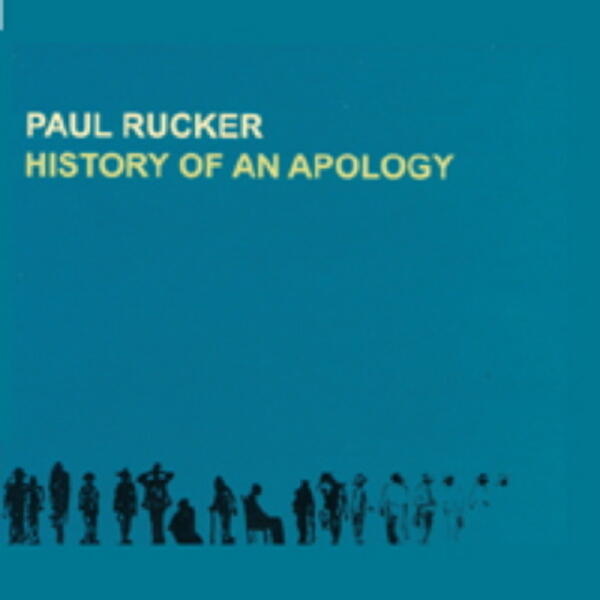 CD History of an ApologyJazz Suite based on the Tuskegee Experiment in which 600 men from rural Alabama were used as human guinea pigs to see the effects of untreated syphilis. The Tuskegee syphilis experiment was an infamous clinical study conducted between 1932 and 1972 by the U.S. Public Health Service to study the natural progression of untreated syphilis in rural African American men who thought they were receiving free health care from the U.S. government. The Public Health Service started working with the Tuskegee Institute in 1932. Investigators enrolled in the study a total of 600 impoverished sharecroppers from Macon County, Alabama. 399 of those men had previously contracted syphilis before the study began, and 201 did not have the disease. The men were given free medical care, meals, and free burial insurance, for participating in the study. They were never told they had syphilis, nor were they ever treated for it. According to the Centers for Disease Control, the men were told they were being treated for "bad blood", a local term for various illnesses that include syphilis, anemia, and fatigue. ______ History of an Apology: Explanation of Metronomic Time: Most listeners look to the drums and/or bass to find a rhythmic or harmonic reference point. In this composition, the bass is playing in 7/4, and the drums are in 6/4. They share the same tempo, but their patterns meet only once every 42 beats. This can be seen graphically using the Measure Map—see measure 6 of the bass, and measure 7 of the drums. Alternately, the Beat Map on the next page shows that they share the same tempo. The spreadsheet indicates this also, showing the beats lining up. Note that the melody in the tenor saxophone is played freely, with breaks after four-bar phrases. And near the end of the composition, a counter melody comes in from the bass clarinet and flute. This counter melody is played at 144bpm, against the bass and drums that are playing at 138bpm, against the melody, which is again playing at 120bpm. At the very end, when parts dissipate, the drums are easily heard playing in 6. Bill Frisell—Guitar Solo Bill Horist—Guitar Hans Teuber—Saxophones, Flute, Bass Clarinet Michael White—Violin Jeff Busch—Cueca Jacques Willis—Drums Paul Rucker—Acoustic Bass The 40-year study was controversial for reasons related to ethical standards, primarily because researchers knowingly failed to treat patients appropriately after the 1940s validation of penicillin as an effective cure for the disease they were studying. ______ Complete CD can be heard here: http://paulrucker.com/projects/recordings/history_of_an_apology Track Listing i never saw my parents dance 0:21 Every Now and Then... 7:12 History of an Apology 7:18 Parents Dance - part one 7:47 All the Things I Thought I Didn't Want 7:37 Sunday Morning Walk in Jasper Texas 6:14 Lost Years 1:36 Parents Dance - part two 6:40
CD History of an ApologyJazz Suite based on the Tuskegee Experiment in which 600 men from rural Alabama were used as human guinea pigs to see the effects of untreated syphilis. The Tuskegee syphilis experiment was an infamous clinical study conducted between 1932 and 1972 by the U.S. Public Health Service to study the natural progression of untreated syphilis in rural African American men who thought they were receiving free health care from the U.S. government. The Public Health Service started working with the Tuskegee Institute in 1932. Investigators enrolled in the study a total of 600 impoverished sharecroppers from Macon County, Alabama. 399 of those men had previously contracted syphilis before the study began, and 201 did not have the disease. The men were given free medical care, meals, and free burial insurance, for participating in the study. They were never told they had syphilis, nor were they ever treated for it. According to the Centers for Disease Control, the men were told they were being treated for "bad blood", a local term for various illnesses that include syphilis, anemia, and fatigue. ______ History of an Apology: Explanation of Metronomic Time: Most listeners look to the drums and/or bass to find a rhythmic or harmonic reference point. In this composition, the bass is playing in 7/4, and the drums are in 6/4. They share the same tempo, but their patterns meet only once every 42 beats. This can be seen graphically using the Measure Map—see measure 6 of the bass, and measure 7 of the drums. Alternately, the Beat Map on the next page shows that they share the same tempo. The spreadsheet indicates this also, showing the beats lining up. Note that the melody in the tenor saxophone is played freely, with breaks after four-bar phrases. And near the end of the composition, a counter melody comes in from the bass clarinet and flute. This counter melody is played at 144bpm, against the bass and drums that are playing at 138bpm, against the melody, which is again playing at 120bpm. At the very end, when parts dissipate, the drums are easily heard playing in 6. Bill Frisell—Guitar Solo Bill Horist—Guitar Hans Teuber—Saxophones, Flute, Bass Clarinet Michael White—Violin Jeff Busch—Cueca Jacques Willis—Drums Paul Rucker—Acoustic Bass The 40-year study was controversial for reasons related to ethical standards, primarily because researchers knowingly failed to treat patients appropriately after the 1940s validation of penicillin as an effective cure for the disease they were studying. ______ Complete CD can be heard here: http://paulrucker.com/projects/recordings/history_of_an_apology Track Listing i never saw my parents dance 0:21 Every Now and Then... 7:12 History of an Apology 7:18 Parents Dance - part one 7:47 All the Things I Thought I Didn't Want 7:37 Sunday Morning Walk in Jasper Texas 6:14 Lost Years 1:36 Parents Dance - part two 6:40
